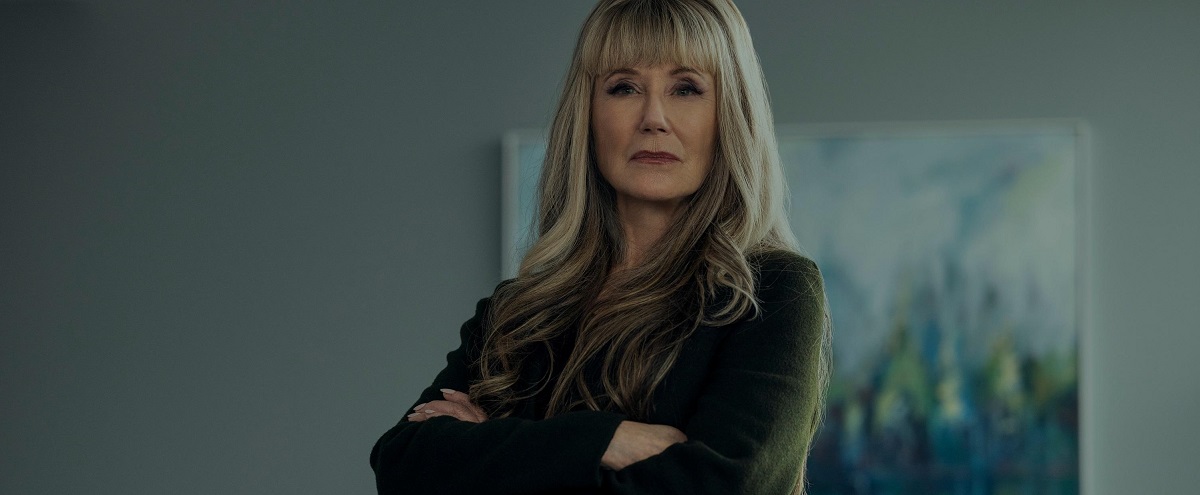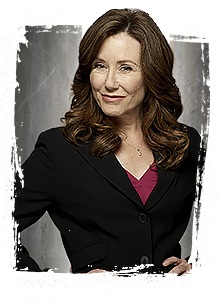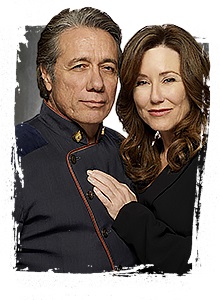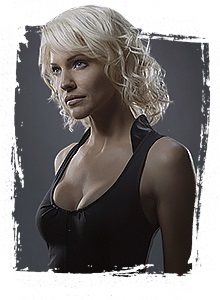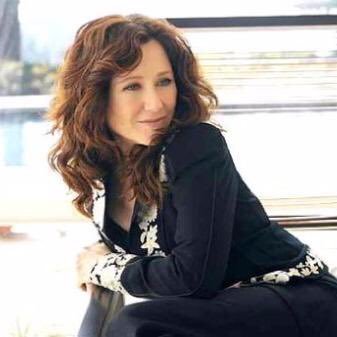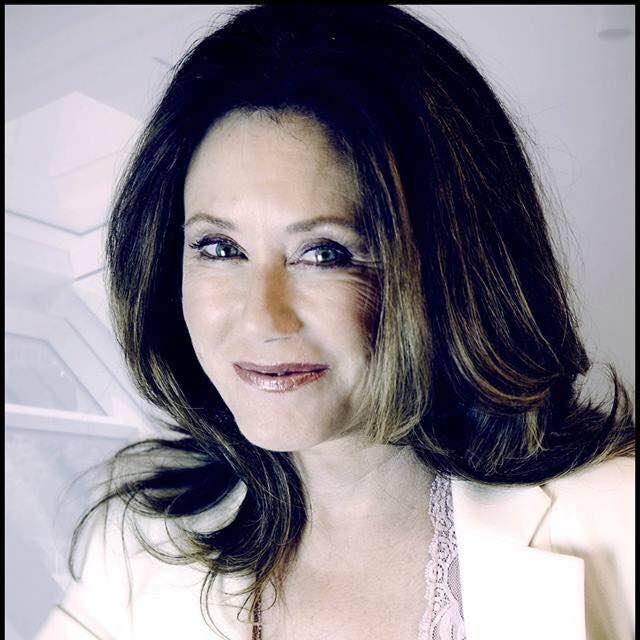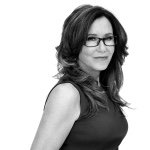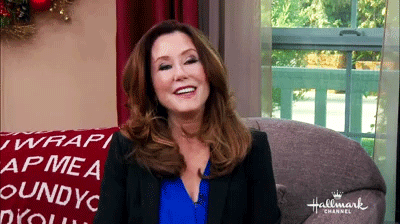
‘Battlestar Galactica’: Presenting the president, Mary McDonnell
Jevon Phillips
March 20, 2009
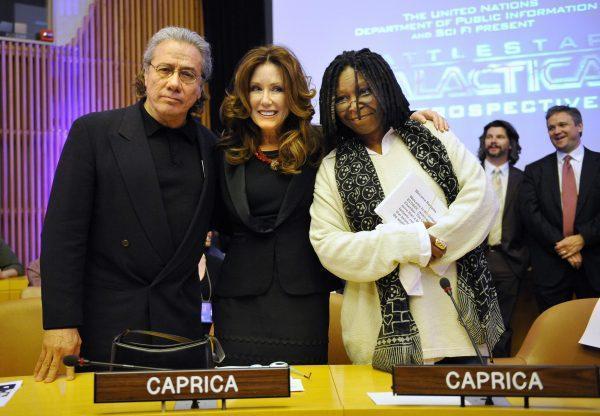
From fledging and reluctant politician to ballot-box-stuffing strongwoman, Mary McDonnell’s Laura Roslin has grown during “Battlestar Galactica,” possibly more than any other character. Suffering through cancer before our eyes while trying to help lead humanity to the promised land, the president of the colonies was a journey for McDonnell, and the show itself was an experience the actress won’t soon forget. We caught up to her the morning before she was to stand in front of the United Nations as part of a delegation presenting “Battlestar Galactica,” literally, to the world.
Everyone speaks of the show as being an allegory of what’s going on in society now, and a visit to the U.N. would be the ultimate complement of that. What do you hope to do there?
I’m sure that what we end up talking about will be relevant to them [the delgates] and will emerge from the situation. Really, what I think we all feel — the four of us who will be on the panel — is we feel honored to be asked to represent the show because they will be showing clips from the show as demonstrations of cultural allegory towards areas of interest that they are experts in at the U.N. They’ll be dealing with human rights and terrorism, children and armed conflict. These issues were all touched upon during “Battlestar,” and the undersecretaries that are in charge of those committees will be speaking about those issues and will bring in clips of “Battlestar.”
That sounds really cool.
It is really cool!
The United Nations. A doctor in your stint on “Grey’s Anatomy.” The president of the colonies! All powerful roles in society for women. Do you feel a sense of duty to portray these roles in a certain manner?
I don’t know if it’s a sense of duty, but I do feel a sense of responsibility to try and find out the truth of it all. Culturally, we really still are getting used to women in these positions. Thank God there are millions of them around the world, but in the media we’re still getting used to them and trying to find a way to portray women in power truthfully, from the inside out rather than typically or [using] the ideas that the male culture has held about what they would be like if they finally got there … . The point for me would be to get so many women out there in these roles that we stop noticing.
There have been more than a few comments on our Show Tracker blog praising your portrayal of a woman with a (so far) terminal disease in cancer, and her strength in the face of what’s going on. Can you talk about your approach to that side of your character?
When the part was first offered to me, I had a meeting with Ron and David, and that was one of my first questions. I said, ‘Well, this is sci-fi, so how quickly can I get rid of my cancer?’ And Ron said, ‘Well really, I think she goes in and out of remission, but I don’t really see the cancer disappearing.’ And I went home and said, ‘No, OK, Mary, you have to be very very clear about this.’ … They reassured me that there would be great moments, great arcs, within the story where she really would be in remission and she’d have her full energy, and I thought, ‘The idea is really wonderful because breast cancer is a nightmare for us and we cannot seem to catch up to it.
And with your beautiful hair, and how you had to lose it (in a sense) for the role, did it affect you as an actress or did you not notice it at all in your character’s evolution?
Oh, no, I definitely noticed it. As you can see, I come from really Irish genes and a sort of a big-hair family, and they’ve been important to me. I see it as part of the feminist situation, so it was hard for me to let go of it, much to the frustration of the casting people around me. So, I tried to approach that and sort of sympathize [that] basically Laura has my hair, so she would have a similar attachment. But what Laura taught me that I didn’t anticipate — she was far more deeply invested in an agenda in life, so she had so much less ego than I have and was able to completely free me up.
What kind of emotions did you have, and what was the mood on the set like as the end neared?
It was pretty dramatically up and down. One minute you feel this wonderful beginning of a relief, then next day incredible grief. Like you’d turn around a see a crew member picking up a cable or something and you’d think, ‘I’m never going to see this person again.’ I’ve been with these people for six years with the miniseries, and you just feel grief.
Ultimately, I finished shooting my part at 3:45 a.m. one morning in the middle of the night, and I was the only one shooting that night and there was just a small crew of us left.
My son was there on the set with me. The two of us went to the airport and got on a plane and flew to L.A. It was shocklingly uneventful and deeply sad. It took me a few days to understand that I was done, then there a feeling of completion and satisfaction. Because we’re not just ending it, we’re ending a story. That’s a very different feeling than you mostly have on television, where suddenly they decide to end your series. Ron wrote a beautiful conclusion to what will now be an amazing saga.
Do you have a favorite or a most affecting episode?
You know, I don’t, I really don’t. I just don’t see things that way. I will watch something and I’ll see Aaron Douglas do some little thing or I’ll see Grace Park do something or I’ll see them all together as pilots or I’ll see Adama alone in his quarters and I loose it over these truly spare human moments. … It’s like when you think back on your family and growing up and you have this memory that’s very emotional, but it would never be the moment that perhaps another sibling would remember … I just have these moments seeing all them there whether they did or didn’t do something, and there’s a quiet truthfulness about them and I just get overwhelmingly moved.
